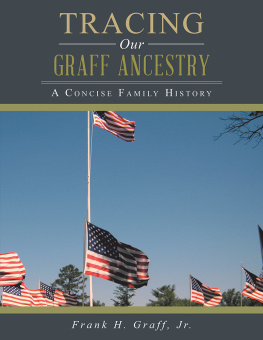Tracing Our
Graff Ancestry
A Concise Family History
Frank H. Graff, Jr.
AuthorHouse
1663 Liberty Drive
Bloomington, IN 47403
www.authorhouse.com
Phone: 1 (800) 839-8640
2015 Frank H. Graff. All rights reserved.
No part of this book may be reproduced, stored in a retrieval system, or transmitted by any means without the written permission of the author.
Published by AuthorHouse 02/1/2016
ISBN: 978-1-5049-5867-7 (sc)
ISBN: 978-1-5049-5868-4 (e)
Library of Congress Control Number: 2015918012
Any people depicted in stock imagery provided by Thinkstock are models, and such images are being used for illustrative purposes only.
Certain stock imagery Thinkstock.
Because of the dynamic nature of the Internet, any web addresses or links contained in this book may have changed since publication and may no longer be valid. The views expressed in this work are solely those of the author and do not necessarily reflect the views of the publisher, and the publisher hereby disclaims any responsibility for them.
Scripture quotations marked NKJV are taken from the New King James Version. Copyright 1982 by Thomas Nelson, Inc. Used by permission. All rights reserved.

Frank H. Graff , Jr
Tracing Our Graff Ance stry
A Concise Family His tory
Contents
The journey of our Graff ancestors begins
The arduous and dangerous journey
Vanguard of German/Americans named Graf
The Graff who served America so well
Graff pioneers who moved westward
Graff kinsman who came to Illinois first
The tragic death of a child
Trials and tribulations that grandfather endured
The kinsman who founded Jackson County
Young Frank Henry and unrequited love
The Graff/Hall marriage
The Graff estate settlement
Monumental injustice
The gift to the Graff sisters
The tip of the branch
Graff family tree
Bibliography and addendum
Introduction
To members of the Graff family and lineal descendants:
It is important to have knowledge of our history and genealogy in order to know where we came from, who we are and why we are here. Although there are those among the Graffs who have not necessarily enjoyed an exemplary reputation, we are Christians whose ancestors came early and contributed substantially in the establishment and building of this Christian Nation. It is the hope of this author that whoever reads this small book will be deeply impressed with the courage, sacrifice and hard work of those whose remarkable efforts have given us a better life.
Before we barter our priceless heritage for a mess of antiChrist pottage, let us look back and give honor to those whose Christian faith and perseverance enabled them to succeed in their endeavor to build better than they had known.
And He (Christ, Jesus) will turn the hearts of the children to their fat hers,
lest (He) come and strike the Earth with a curse. (Malachi 4:6 NKJV)
It is not the spirit of my intent to indulge in ancestor worship; but rather, with humility and condescension, to pay proper respect for what they accomplished.
The journey began in western Europe. It has been determined that our Graf ancestors came from Germanys Palatinate area, which lies in southwestern Germany. This is supported by the fact that the vast majority of Germanic immigrants came from that region during the 17 th century. The term Pennsylvania (Deutsch) Dutch pertains to: Descendants of immigrants from Palatine, SW Germany, and from Switzerland, who settled in Pennsylvania in the 17 th and 18 th Centuries. The language spoken by these people was a High German dialect with an admixture of English. (Funk & Wagnalls, page 997)
These German people fled from their homeland because of religious persecution, war and poverty. In the aftermath of the Lutheran-Protestant Reformation, the Roman Pope was attempting with mercenary armies to force the German Lutherans back under Roman rule. For example, the Thirty years War raged across Germany from 1618 to 1648. The invading armies would sweep through the German countryside as a monstrous beast; they lived off the land as they destroyed homes, murdered and plundered countless German people. We have every indication that our Graf* ancestors became Lutherans at the time of Martin Luther (born 1483 and died 1546).
The desire to again enjoy a peaceful pastoral lifestyle in a new land was surely a factor in causing our ancestors to leave Germany for the New World. They had been land owners and farmers for generations. After repeatedly attempting to rebuild their homes and shattered lives, the invading armies would repeat the destruction all over again. However, the Palatine Germans still retained their desire for land to sustain them, and to provide an enduring legacy for their children. The only way they could achieve this goal was to make the perilous journey across nineteen hundred miles of the Atlantic Ocean to this north American continent.
It is not known with absolute certainty as to when our Graf ancestors undertook this voyage. Many years ago there was documentation in my possession, which has since been lost, that stated that our Graff ancestor first arrived on this north American continent during the year 1650 and settled in the area which became eastern Pennsylvania. If this is correct William Penn, (born in 1644) founder of Pennsylvania, would have been six years of age. (Comptons Volume 11, 1937 Edition, page 111.)
The name Graf (original spelling) is a term meaning Count: this is a Ge rman
Austrian or Swedish title of nobility. (Funk & Wagnalls, page 581)
The following involves some speculation; however, the Graf journey probably began on the Rhine River, northwest to the seacoast town of Rotterdam, Netherlands. Depending on the exact starting point and the level of the river, this initial part of the journey is estimated to have required four to six weeks. After arriving in Rotterdam, our Graf immigrants would have had to wait in a temporary camp for a ship to take them to America. Undoubtedly, these camps were squalid affairs with limited food supplies and non-existent sanitation. Temporary shelters would have been constructed from whatever materials could be found in the surrounding area. A modern-day analogy would be a refugee camp. It was necessary to wait for a ship to become available upon which passage could be arranged. At this point in the history of our white western-European people, the immigration to America began as a trickle and subsequently became a flood. The Christian-English Pilgrims in 1620, who had been the vanguard of this movement, had transplanted the cross of Christ from old corrupt Europe to this pristine north American continent. This was all done in fulfillment of Bible prophecy. ( see Jeremiah 3:14) Consequently, the United States of America is the only Nation in the history of mankind that was founded upon the Jesus Christ of our Christian Bible. As Christian people, our Graf ancestors were simply a part of this mass migration to the New World.
Those who undertook this voyage endured hardships that we can scarcely imagine. At that time, the ships which made the transatlantic crossing were small wooden sailing ships. Depending upon the severity of the north-Atlantic storms, the trip required from seven to nine weeks. When encountering a storm and the sea became turbulent, the ships crew would furl the sails and allow the ship to drift. Of course, this action would prolong the voyage. The lack of good food and water aboard ship, combined with the crowding of passengers below deck and the constant rolling and pitching of the ship, made many of them sick and despairing for their very survival.
Next page











